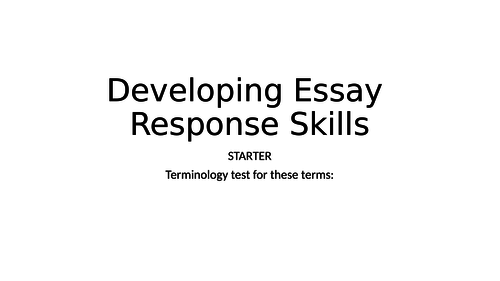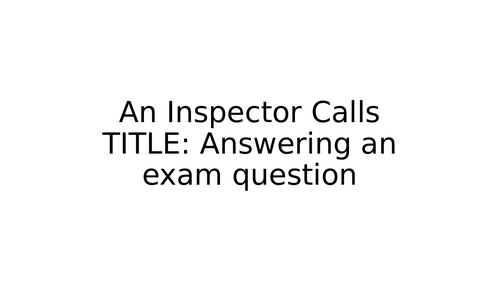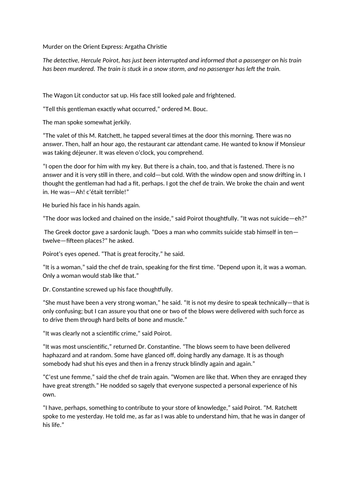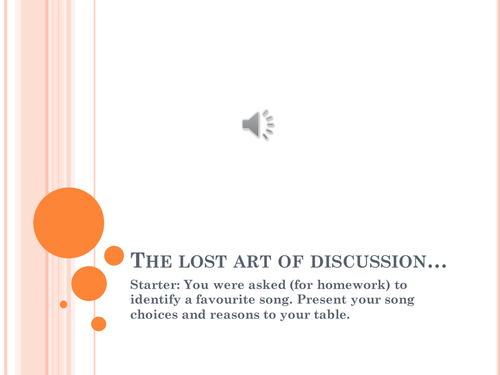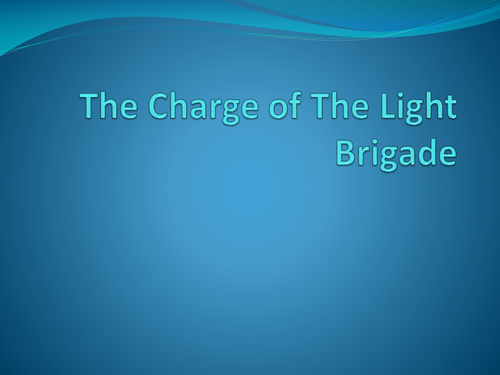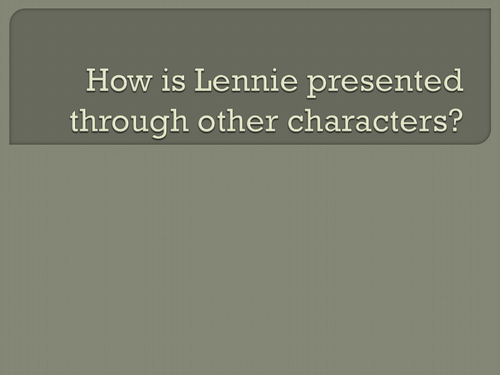
228Uploads
548k+Views
1363k+Downloads
English language arts
Sale

AQA Power and Conflict Poetry Scheme of Work
One power point per poem and some associated skills. I teach the poems in the order in which they appear in the anthology (except Tissue; I put that one at the end).
I follow a pattern with the lessons and source the contextual information from the BBC Bitesize website (and a couple of other places when I get bored of them) - it makes sense as any student that misses out on something can go and find what they need relatively quickly. The material is readily available elsewhere, hence the relatively low price for so many lessons.
NOTE: I have upgraded these lessons now. I’ve moved away from endorsing the PEEL style responses - the exam reports indicate clearly this is the thing to do. Additionally, I have included much more of a focus on the POWER themes. Lastly, I have used these poems as a springboard to discuss gender issues - part of this is my attempt to narrow the gender gap at the top end of GCSE English achievement by trying to get the lads to be more engaged with the material.
These lessons are designed to work in tandem with my own version of the poetry anthology. At the moment, I have yet to upload the edited version but I shall do so soon. That being said, the power points wouldn’t take much editing to use them with the traditional AQA version. All of the original lessons are included just in case you are still using the PEEL method of building a response.
Bundle Sale

AQA English Language - The Complete Approach
A collection of all of my English Language resources. This also includes a spreadsheet for the tracking of the course.
Sale

AQA A-Level English Language and Literature: Othello - Lesson 1
A reintroduction lesson that should be taught with the understanding that the students have read the text beforehand. Designed as an entry point into year 13; ideal for new teachers looking to get the measure of a new class (as in my case).
I found this lesson particularly useful when combined with FAR marking the material surrounding the quotations.
You should view this as a starting point - future lessons will get much more specific.
Sale

AQA A-Level English Language and Literature: Othello - Lesson 2 (Soliloquies)
My second lesson. Here, I focus almost entirely on ACT 2 SCENE 1 and Iago's soliloquies therein. The notes element of the power point pulls a lot of thinking together from across a lot of sources - you'll need these notes to flesh out the tasks. I tie it up with an exam style question at the end focusing on what we can infer about attitudes to women. Quite pleased with how this looks and how it goes.
Sale

AQA A-Level English Language and Literature: Othello - Lesson 4 (The Violence Within)
A thematic exploration of Violence within Othello - focusing specifically on Act 4. Also, the power point starts with a little revision of characters and quotations from across the play. I found this a fun lesson.
Sale

KS3: SPaG Understanding a Text Lessons (Using Michael Grant's "Gone" series as a stimulus)
SPAG lessons can get a little flat at times. These are the worksheets I’ve designed to use with my own SPAG group. It is designed to be taught in tandem with a Dystopian Fiction SoW that ends with a reading assessment. Specifically, these lessons focus on an extract taken from Michael Grant’s “Gone” - all extracts taken from the first chapter. The aim is to develop an increased understanding of each text through the asking of more and more complex questions. The tasks can be sat as part of a lesson (I reckon they’ll take most groups between 10-30 minutes depending on the groups setting), or make ideal homework and/or extension tasks.
At the moment, the resources are set up to be taught to lower set year 7 students. But, it won’t be too hard to change the tasks to more suitable ones for any set.
UPDATE: I’ve included some versions that are more suited to be printed out. They have some basic RAG feedback grids on the back with some generic targets.
Sale

AQA English Language and Literature: Developing essay response skills to the Paris Anthology section
This is my attempt to engage and develop my Year 12s academic voices in their Paris Anthology related essay responses. The main issue my class had seemed to focus upon when and where to start. What I do is show them how they can place a particular emphasis on one of several potential areas of focus initially. I show them how they could use Mode, Audience, Purpose, each of Grice’s Maxims and each of the different levels of language as a starting point for an analytical response. The attached word document appears to be an “essay”.It isn’t. It’s the collected starting points placed in one document so that the students can focus more on the “how you do it” instead of trying to copy down the best bits.
It worked reasonably well and is suited for a class with similar needs. Hope you find this useful.
Sale

KS3: Survival Reading Assessment
A series of lessons and resources designed for a top set year 8 class. The extracts are a mixture of fiction and non-fiction. The focus was to take a group of year 8 students who are used to using the PEE structure and get them to write a concept focused response. I’ve included the model responses we built as a class, as well as the model response the students were provided.
Sale

AQA English Literature: An Inspector Calls essay building lesson
A lesson that models the process of building a high-end An Inspector Calls essay. Please note, the lesson assumes that the class has read the play and has attempted versions of the AQA English Literature questions already. Also, the lesson works best as an aspirational example: I concentrate on using sophisticated language to shape my points, and focus on integrating appropriate references. Please note I’ve deliberately left some academic “gaps” too - this model response is a high-quality response, but there are other avenues of academic insight that can be taken.
Bottom line, to get the most out of this lesson, you’ll need to spend a little time going through it all first - hence the low price.
Sale

KS3: Born a Crime - Structure Focus
A lesson take from a collaborative scheme of work. The lesson focuses on the quite excellent Born A Crime by Trevor Noah. The focus is developing an initial understanding of South Africa, then Trevor Noah himself, before focusing in on the context surrounding the story itself.
After, the focus switches to analysing the structural choices made in the extract.
Additionally, I’ve included a useful little follow up lesson where the focus ins to build a piece of creative writing that follows a specific structural path.
Bundle Sale

AQA English Literature Paper 1 Bundle
Jekyll & Hyde, A Christmas Carol and Romeo & Juliet resources PLUS a spreadsheet to track them all.
Sale

AQA English Literature: A Christmas Carol Method Focus Essay Builder
My year 11s were STILL struggling with how to frame a method, so I came up with this stand alone lesson. The idea is that, having reviewed the slide where the methods are explicitly identified, the students will see that a method and a quotation are not the same thing.
This was a successful lesson.
UPDATE: I repeated this process with a bottom set year 10 class where I was even more specific. This was also a successful lesson, so I’ve included it.
Sale

KS3: Murder on The Orient Express Language Task - Method Focus
Using a format that proved successful in the KS4 arena, I’ve adapted the thinking to apply to an AQA English Language P1 Q2/P2 Q3 style task that would fit for a higher ability top set KS3 class.
The approach is to initially read the extract then to specifically identify concepts that relate to a language focused task, followed be explicitly identifying language based methods and incorporating into a response.
Bundle Sale

English Data Collation Special
Quite simply, the spreadsheets in here will allow you to track every single year group in Key Stage 3 and 4. The focus will be on preparation for the AQA English GCSE examinations.
Sale

KS3: Introduction to Pre-1914 texts
A useful little unit that we put together to fill a 2/3 week gap. It has the students explore pre-1914 material - poetry and prose - and ends with a controlled assessment in the vein of the old AQA English style questions for the Literature paper.
Might fill some other gaps out there in shorter half terms.
Sale

KS4: Room 202 Speaking and Listening Presentations, Debates and Discussions
3 Lessons taken from the old(er) version of the AQA English Language specification (the one where S&L counted towards the grades).
I know it counts for nothing now, but it still needs to be done. These three lessons prepare a class to give a presentation OR take part in a discussion about a selected item they would save from the imaginatively named Room 202.
Enjoy.
Sale

Discussing and Listening
Four lessons that focus on improving your students abilities surrounding discussion and listening - somewhat lost art forms. Numerous discussion topics at group and whole class level.

KS4: Shakespeare and Conflict Poems: CONFLICT
Focused on the Shakespearean text vs the Conflict Poetry from the literary heritage. Very structured against the bands and pointed towards the controlled assessment.

KS4 GCSE Prose Of Mice and Men Pack
Contained within this pack is all the resources i used in my GTP year with a bottom set Year 10 GCSE group. I had mixed success bu i felt my teaching got stronger as i went through this unit. A starting point for those wondering where to start perhaps, or another way of looking at a topic thoroughly done.

Animal Farm KS3 resource pack
I've taught this to top set year 8 and year 9 - had more success with the year 9s to be honest, but I think this would work with year 8s further in to the year. This was a series of lessons taught over the enormous 8 week half term. Hope the resources are useful to you!







